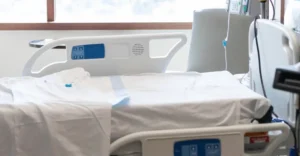A woman who was reportedly “dead for 17 minutes” during a gym workout had an unforgettable experience.
Victoria Thomas, a 35-year-old accountant, collapsed in the middle of a high-intensity boot camp session after lifting weights.
She recalled feeling unwell — nauseous, lightheaded, completely drained, and slightly dizzy — just moments before losing consciousness.
“I was also feeling a bit dizzy. I had just mentioned it when I suddenly collapsed to the floor,” Victoria told the Mirror.
Paramedics arrived swiftly and began performing CPR. With every second that passed without a response, concerns deepened.
She described what happened next: “Everything went black at first, then I suddenly became aware that I was looking down at my own body.
“I was floating near the ceiling, watching myself lying on the gym floor. The first thing I thought was that my legs looked really fat. Later, when I saw a photo taken just minutes before I collapsed, I realized they were actually swollen.
“I didn’t see any bright light or feel a sense of peace — I was simply observing. I could see yellow machines surrounding me.”
After 17 minutes, her heart finally started beating again.
At the time, Victoria was healthy, active, and had no known heart conditions.
“They never gave up on me,” she said. “Minutes kept passing, but they didn’t stop trying. I was so young, fit, and healthy — it happened completely out of nowhere.”

Victoria spent three days in a coma at Bristol Royal Infirmary.
To support her weakened heart, doctors implanted a pacemaker that could restart it if needed. Although she had no family history of heart disease, her heart stopped multiple times in the following months—each time, the pacemaker shocked it back into rhythm.
Incredibly, just three weeks after collapsing, Victoria returned to playing netball—this time while wearing a defibrillator. “It was a shock whenever it went off,” she recalled, “but it gave me the chance to live a normal life again, and I was so thankful for that.”
In February 2021, Victoria became pregnant—an event that placed further strain on her already fragile heart.
She suffered repeated cardiac arrests, and at 24 weeks pregnant, doctors finally diagnosed her with Danon disease—a rare genetic condition affecting fewer than one million people worldwide, according to the Mirror.
The disorder is caused by a mutation in the LAMP2 gene, which is supposed to produce an enzyme essential for heart health. Life expectancy for those with Danon disease is just 19 years for men and around 24 for women.
“I was 24 weeks pregnant with Tommy when I found out, and I was in complete shock. I couldn’t process it,” Victoria said.
Doctors initially urged her to deliver the baby immediately, but she was determined to wait.
At 24 weeks, the baby’s survival odds were slim. But by 30 weeks, Victoria’s condition had deteriorated—she could barely breathe due to fluid buildup around her heart. Doctors had no choice but to perform an emergency caesarean.
Thankfully, baby Tommy survived. But the pregnancy had severely damaged Victoria’s heart.
By the time Tommy was six months old, Victoria couldn’t even climb a flight of stairs without becoming breathless.
In April 2022, tests revealed her heart was functioning at only 11% capacity—a sign of severe heart failure.
Doctors gave her only a few months to live. “When I asked how long I had left, they told me a couple of months. It was heartbreaking. All I could think about was Tommy. I made a promise to myself that I wouldn’t leave him.”
Victoria was placed on the urgent transplant list and remained in hospital, seeing her son only during short visits.
“I’d hold him tightly and treasure every second we had together,” she said.
Twice, donor hearts became available—but both were ruled out after further checks.
“Each time I’d get hopeful, thinking this was my chance to be saved,” she said. “Then they’d tell me the surgery couldn’t happen. I started to believe a heart would never come. I lost all hope.”
But in April 2023, the call finally came: a matching donor heart had been found.
The transplant, performed at Queen Elizabeth Hospital in Birmingham, was a success. By May, Victoria was back home.
“I had been in the hospital since Tommy’s first birthday in October, and now I was finally back home with him. I couldn’t believe it.”
Despite experiencing some episodes of rejection after surgery, Victoria has made a full recovery.
She’s returned to playing netball four times a week and is preparing to represent her country in volleyball and basketball at the upcoming World Transplant Games in Germany.
Tommy is now three years old, and genetic tests show that Victoria no longer carries the Danon disease mutation—and none of her family members are affected either.
